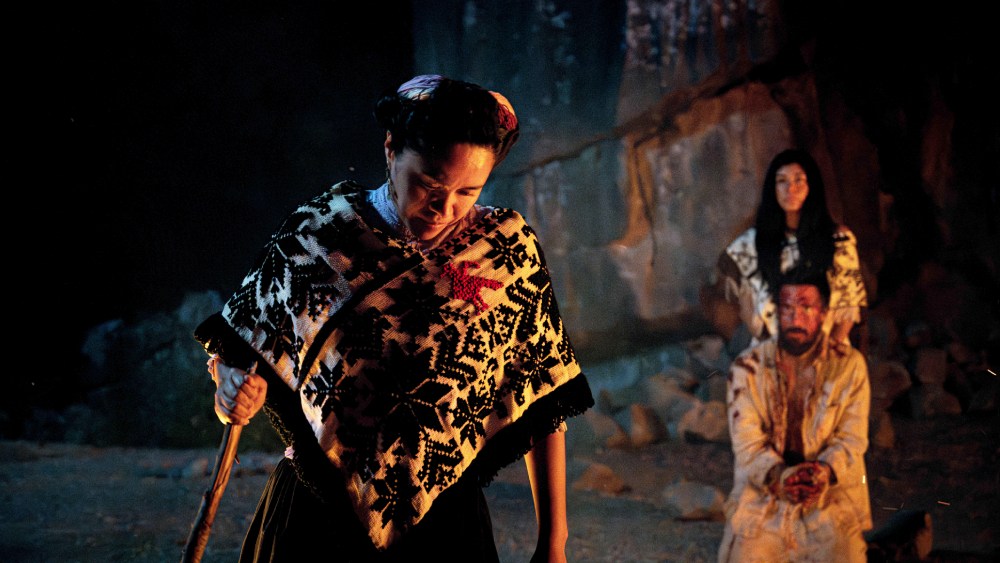Adrian García Bogliano’s Mórbido production “Talking to a Stranger,” starring Gigi Saul Guerrero, and the awaited “The Muglur,” set up at Paulina Villavicencio’s “Huesera” production house Disruptiva Films and Sound, feature among seven titles packing out the Cannes Film Festival’s Blood Window showcase, unspooling at its Marché du Film May 15.
Also making the cut are “Love Kills,” the latest from Brazil’s Luiza Shelling, a producer on Netflix hit “Yakuza Princess,” who won La Mayor Cine award at December’s Blood Window Screenings Awards where “Telkenchu” scooped Lahaye Media and Chemistry prizes.
Blood Window marks a new generation of Latin American and Spanish genre filmmakers. Four titles are first features, Shelling’s “Love Kills” just her second, “Black Water” director Santiago Ventura’s third.
As Argentina battles with inflation and pared-back governmental incentives, the selection underscores México’s suzerainty in Latin American horror producing four of the seven Blood Window’s movies.
The selection also suggests just how far genre – horror, sci fi, fantasy – has evolved over the last decade in Latin America. In 2017, when as a project “The Muglur” won a Blood Window first feature award, it was hailed by Variety as a pioneering “gore-free, literature-based fantasy-thriller with a female director and executive producer.” Men still dominate Blood Window. Five titles this year, however, boast at least one female key creative or producer.
Most titles make large psychological point, protagonists reacting to family tragedy: a dead child, a deceased mother, an alcoholic father. Though highly disparate, “The Muglur” is a “character-driven fantasy thriller,” says director Lucila Las Heras; “The Mantises” is a “coming-of-age thriller,” says helmer Didac Gimeno, “Black Water” a coming-of-age psychological thriller.
“Game Over” turns on “grief and loneliness because, another wonderful thing about horror is how, despite being plagued by monsters, it always connects us to our most human emotions,” comments its director, Carlos Marín.
These films are made with care and flair. “The Muglur” “is a project with a solid story and meticulously hand-crafted visual quality,” says its director.
“Sound is key: the whisper of the wind through the trees, the crackling of leaves, the held breath before punishment,” says helmer Carlos Matienzo Sermiento of “Tekenchu: The Guardian of the Forest.”
Shot on Super16mm, “‘The Mantises’is part of a new wave of fantasy cinema that embraces the visual and the symbolic as its primary narrative language,” notes Gimeno, citing as other examples “A Ghost Story,” Dream Scenario and “I Saw the TV Glow.”
These are also films with a market. In early business dealing, Cinépolis, Mexico’s production-distribution house and exhibition giant, has picked up Mexico and Latin American distribution rights to “The Muglur.” Syldavia Cinema will distribute “The Mantises” in Spain.
The titles:
“Black Water,” (“Agua Negra,” Santiago Ventura, Uruguay)
Backed by two fixtures on Uruguay’s production scene, director Ventura’s Chesterfims and Sundance winner “Utama” co-producer La Mayor, a coming-of-age psychological thriller with erotic undertones sluiced by adrenaline-fuelled sports drama, says Ventura. Mara travels from Uruguay to Argentina to train for the World Championships under Laura, a former Olympic Champion. “Black Water explores a symbiotic and destructive relationship between Mara and her coach Laura,
inspired by the black widow spider that devours its mate,” says Ventura. Co-produced by Guainot Producciones (Spain) and Metanoia Films (Uruguay).
Black Water
Courtesy of Blood Window
“Game Over,” (Carlos Marín, Mexico)
Seen at December’s Ventana Sur, a horror/monster movie, produced by Jalisco’s Pulsar Films, an associate producer on Caye Casas’ cult hit “The Coffee Table,” along with New Art, Sonido para Cine and LCI Seguros. In it, after her sister’s mysterious death, Rebeca investigates an urban myth about a cursed video game that kills everyone who plays it. The film has “everything I love about the genre: suspenseful sequences, a strong final girl, and a style of gore that is a celebration of practical effects over CGI,” says Marín, a writer on three-time Mexican Academy Ariel Award nominee “Massacre in Teques.”

Game Over
Courtesy of Blood Window
“Love Kills,” (Luiza Shelling Tubaldini, Brazil)
Set in São Paulo’s crack-ravaged downtown, a “thriller romantasy,” says Shelling, between a young Black vampire Helena and naive human Marcos, which helps Helena to rediscover her humanity. Inspired by “one of the most amazing graphic novels released recently in Brazil,” Shelling tells Variety, “Love Kills” “explores the vampire universe as a metaphor for trauma, exclusion and self identity. The film addresses abusive relations from the perspective of marginalized women, with a thriller element. Vampires are a proxy to being trans,” says Shelling. Produced by Brazil’s Filmland Internacional, which is focused on fantasy/genre films for theatrical mainstream distribution that mostly frame female-lead stories.

Love Kills
Courtesy of Blood Window
“The Mantises,” (“Las Mantis,” Didac Gimeno, Spain)
After her mother dies, Aitana, 13, spends the summer at her aunt and uncle’s country house, where she meets a spirit guide in a nearby forest, which allows her to understand her mother’s death. A “poetic ghost film” where “the border between the world of the living and the dead is erased and the forest and its animals are a portal to the afterlife,” says Didac. “The Mantises” is lead produced by MGC, based in the Canary Islands ‘Tenerife and a producer on Cannes Directors’ Fortnight selected “Song Without a Name.” DarkStudios, El Médano, DarkStudios, Motoneta Cine and Wild Lemon also produce.

The Mantises
Courtesy of Blood Window
“The Muglur,” (Lucila Las Heras, Mexico, Argentina)
Stuck writing her first novel, which infuriates her alcoholic father, an introverted girl turns to the Muglur, an eerie creature who provides inspiration but maybe at the cost of her losing her soul. “It’s about loneliness, loss, addictions, and the pursuit of one’s dreams,” says Las Heras. Produced by Marco Antonio Salgado at BDC Productions (“Jairo’s Revenge”), Villavicencio, and Cinépolis in Mexico, “The Muglur” is co-produced by Las Heras’ Leo Films (“The Open Window”) and Gualicho Cine (“A House With Two Dogs”) from Argentina.

The Muglur
Courtesy of Blood Window
“Tekenchu, The Guardian of the Forest,” (Carlos Martínez Serment, Mexico)
Set in the dense forests of San Luis Potosí, Gabriel, a wounded fugitive, is rescued by two healers in a village gripped by fear. A federal officer investigates child murders, as an ancient force awakens: Tekenchu, a merciless half-human, half-beast source of justice. “‘Tekenchu’ is a journey into the deepest corners of ancestral fear — a tale where terror becomes a living character and justice is not delivered by man, but by forces far older,” Martínez tells Variety. Produced by Ki Visual and co-produced by Chemistry Cine, Lahaye Media, Semillero Estudios, Strobe Films, a Blood Window 2024 winner.
“Talking to a Stranger,” (Adrian García Bogliano)
The latest from several icons of Latin American genre, such as the Madrid-born, Argentina-bred and from 2011 Mexico-based writer-director García Bogliano, behind “Here Comes the Devil,” which swept the 2012 Austin Fantastic Fest, and 2022 Mexican box office hit “La Exorcista.” Backed by Pablo Guisa’s Mórbido and Mexican producer-distributor Corazón Films, a powerful combination, a supernatural psychological thriller starring writer-director-thesp Gigi Saul Guerrero (“La Quinceañera”) as a woman with psychiatric issues tormented by a supernatural evil masquerading as her dead son. “Through shifting perspectives, the film morphs into an unstable nightmare, leaving viewers uncertain of what’s real or imagined – or what horror follows next,” García Bogliano enthuses.

Talking to a Stranger
Courtesy of Blood Window
Read the full article here








